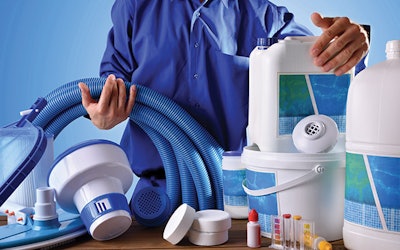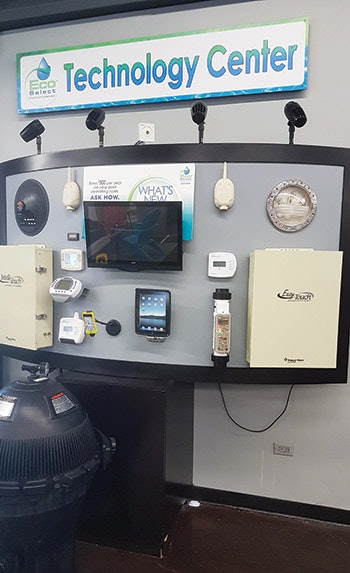
Salt chlorine generators can be one of the richest revenue streams in a retail operation. Modern consumers have embraced salt chlorine generators and the convenience they provide; they often need little convincing, having made up their mind after a discussion with a neighbor or after some basic online research. To maximize the potential of the sale, however, and ensure the customer remains satisfied with the purchase, education and ongoing maintenance products are essential. Retailers are learning this is not a product you sell and walk away from. Consumers need to be fully trained on how the product works and provided with a simple "salt-system program" that addresses the maintenance needs of a salt pool.
Not only will a well-organized plan ensure customer loyalty, but it will also lead to a regular stream of profits for retail stores.
 Layout of the salt chlorine generator technology center at Aqua Tech Pool, Spa & Bath in Winnepeg, Manitoba, where Kathi Belcourt manages retail operations. A display like this educates customers and helps dispel common misconceptions, she says. 'Most consumers still think that a 'salt pool' doesn't use any chlorine.'
Layout of the salt chlorine generator technology center at Aqua Tech Pool, Spa & Bath in Winnepeg, Manitoba, where Kathi Belcourt manages retail operations. A display like this educates customers and helps dispel common misconceptions, she says. 'Most consumers still think that a 'salt pool' doesn't use any chlorine.'
SELLING 'SALT POOLS'
The start of this fruitful relationship often begins when a customer walks into your store and requests that you make their pool a "salt pool." This is good news and bad news. To this day, despite the maturity of the product, many consumers still labor under false impressions of what a salt chlorine generator does and how it works.
"We find that most consumers still think that a 'salt pool' doesn't use any chlorine," says Kathi Belcourt, retail manager of Aqua Tech Pool, Spa & Bath in Winnepeg, Manitoba. "In fact, many consumers believe the installation of that magical device eliminates the need to do anything else to the pool."
This really amounts to an opportunity for the retailer. "Once the consumer has the 'salt pool' they want," says John Bokor, Midwest regional sales manager for Haviland Pool and Spa, "retailers need to educate the consumer on how to get the most value out of their salt-chlorine generator investment. This is a huge potential profit center that allows specialty retailers to drastically increase their profits with a salt support chemical maintenance program."
In teaching customers about SCGs and laying out a maintenance plan, it's important to use clear language and state the facts. Some find the topic complex, and customers have limited time.
RELATED: How Salt Chlorine Generators Work
"We quickly learned that our retail team had to all get on the same page and be sure the information we provided was presented in a cohesive manner, using the same terms," says Dan Cosby, store manager of Dartmouth Pools in New Bedford, Mass.
Be as concise as possible. As pool professionals, we need to explain to consumers that the salt chlorine generator eliminates the need to put chlorine tabs, granular chlorine or liquid chlorine into the feeder once a week. Instead, consumers just add salt into the chlorine generator at the beginning of the season — making it more convenient and much safer to sanitize the pool water by eliminating the handling of chemicals.
That simple explanation is very appealing to customers, says Jonathan Schulhoff, retail manager of Arthur Edwards Pool and Spa Centre in Millers Place, N.Y. "The success of salt-chlorine generators comes from the fact that people do not want to handle chlorine tablets and they don't want to deal with chlorine feeders and chlorine feeder fumes," he says.
Builders, retailers and even service professionals love selling and installing salt chlorine generators due to their healthy margins. But the profits and other benefits can continue when retailers market "salt support" products and services to accompany the sale. These specialty products can provide higher profits to retailers than those of granular, liquid or chlorine tabs — and should be part of an established regimen.
"By creating a specialized salt program, retailers can continue to increase their profits, stand out from competitors and most importantly, keep their customers happy with their pool," Bokor says.
KEEP IT SIMPLE
The first big hurdle: Explain to "salt pool" owners that their pool water is special and needs a special maintenance program to protect their investment.
"Many of the consumers that come in think that because they are using salt, they are going to save money on chemicals," Belcourt explains. "Our job is to explain how it all works, how their salt pool requires special salt-support products and that by following the program they will enjoy the many benefits of having a salt-chlorine generator on their pool for the long-term."
RELATED: What Customers Need To Know About Maintaining Salt Chlorine Pools
It's hard to take the time needed to explain the complexity of how a salt chlorine generator works and how it changes the makeup of the pool water: things like why the device creates heat, how it changes the pH, why there might be an increase in corrosion and scale, the importance of not adding phosphates to the water, etc. Some customers want background on every one of these side effects of SCG use, but most just want a simple recipe.
Figuring out how to sell a salt pool program will be different for each retailer, but a salt pool customer needs to be handled differently than the non-salt pool customers, Cosby says. "Once our staff was all on board about the way we explained the salt-chlorine generator, then we had to have a very specific salt pool maintenance program for our customers."
SALT SECTIONSavvy retailers can simplify maintenance by creating a special salt section of the store, just for salt pool customers. Grocery stores now have an "organic" section — follow this example and guide salt pool owners to proper section of the store so they can quickly get their products. "You don't want a consumer with a saltchlorine generator to head into the general chemical section and be overwhelmed — especially in the heat of the season when the store is busy and you might not have staff available to help a client immediately," Bokor says. "Get the client to the right section of the store and you can then have signage and videos that make it easy for the consumer to pick up what they need." |











































